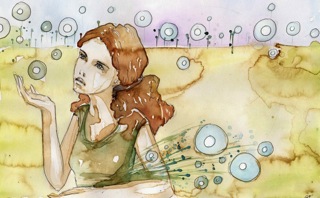
Do you feel you need anti-depressants or anti-anxiety medications, or has your doctor said you do? Although true depression or anxiety disorders need management, many women are misled into believing they need treatment for what is actually normal behavior. Women are designed to be sensitive to their environments, emotionally in tune with their children and loved ones, and intuitive — traits that ensure survival. Women are also wired to express emotions and to pick up on the emotions of others.
Unfortunately, emotionality is not socially acceptable despite being a sign of good health in women. What is not so healthy is the constant pressure to apologize for and restrain emotionality for fear of being regarded as weak or hysterical.
Pharmaceutical companies, astute in the psychology of selling, spin this into sales targeted at women. In ads for antidepressants 93 percent feature a woman, usually a lonely single woman or stressed-out single mom. One in four American women take an antidepressant compared to one in seven men.
Women are more likely than men to express negative feelings through sadness and worry, which can be interpreted as a psychiatric disorder requiring medication. Men are more prone to express negative feelings as anger or through substance abuse, which are not as easy to address pharmaceutically.
Furthermore, when we paint depression and anxiety as women's problems, men truly suffering from these problems are more likely to go overlooked. Women are almost twice as likely than men to receive a diagnosis of depression or anxiety.
Is it a lifestyle issue or a true disorder?
Many women turn to prescription drugs to help them manage feeling that are actually natural responses to unnatural stressors: chronic sleep deprivation, too little time outdoors, unhealthy diets, social isolation, over exposure to toxins and electric light, and over packed schedules. The human animal simply wasn't designed to live optimally in today's highly artificial, stressed-out environment.
Again, this is not meant to dismiss or minimize genuine depressive or anxiety disorders. But is your state of mind a reasonable response to your situation or a mental disorder? For instance, crying which is seen as a sign of weakness, is actually a healthy way for many women to express sadness, frustration, fear, or other strong emotions. Women who take SSRI antidepressants (selective serotonin reuptake inhibitors) find it's difficult to cry. They also experience more apathy and indifference.
Natural approaches to sadness and worry
Unfortunately, we can't wave a magic wand and remove the stressors from life. However, it's helpful and important to prioritize basic biological needs: plenty of sleep, good nutrition, healthy socialization, physical activity, and time outdoors.
Also, many natural compounds can address brain chemical imbalances to help boost your mental well being and function. Adrenal adaptogens are herbs that help buffer the effects of stress on your body and brain. Dietary strategies that balance blood sugar and tame inflammation can also result in profound improvements in mood.
It's also important, though, to know that what you're experiencing may just be a part of being that finely tuned emotional instrument known as a woman.



Latest from the Blog
Do You Know What Is In Your Protein Powder?
January 14, 2025What’s Really in Your Protein Powder? Understanding the Risks Protein powders are a staple in many health-conscious diets, from athletes seeking muscle recovery to those simply aiming to boost their daily protein intake. With a wide variety of options available, choosing the right one can feel overwhelming. However, recent findings have raised concerns about what’s […] Read more
Latest from the Blog
Breaking Through Cancer Barriers: News Outlets Spotlight High-Dose Vitamin C Therapy
https://www.yahoo.com/news/pancreatic-cancer-patient-survival-doubled-152722177.html Harnessing the Power of High-Dose Vitamin C in Cancer Treatment Recent advances in cancer treatment research have brought renewed attention to high-dose intravenous (IV) vitamin C, particularly in extending survival rates for patients with advanced different forms of cancer. A groundbreaking phase 2 clinical trial Study Finds demonstrated that combining high-dose IV vitamin C […] Read more